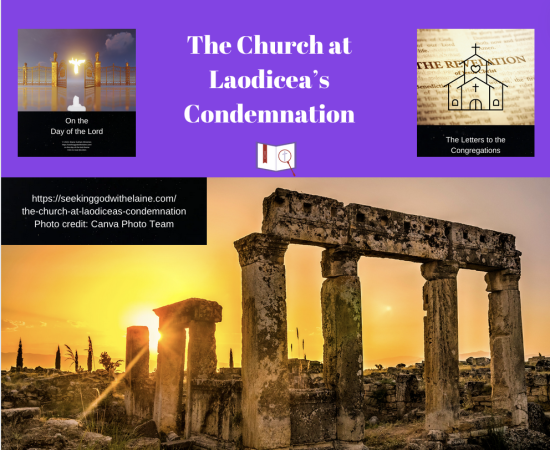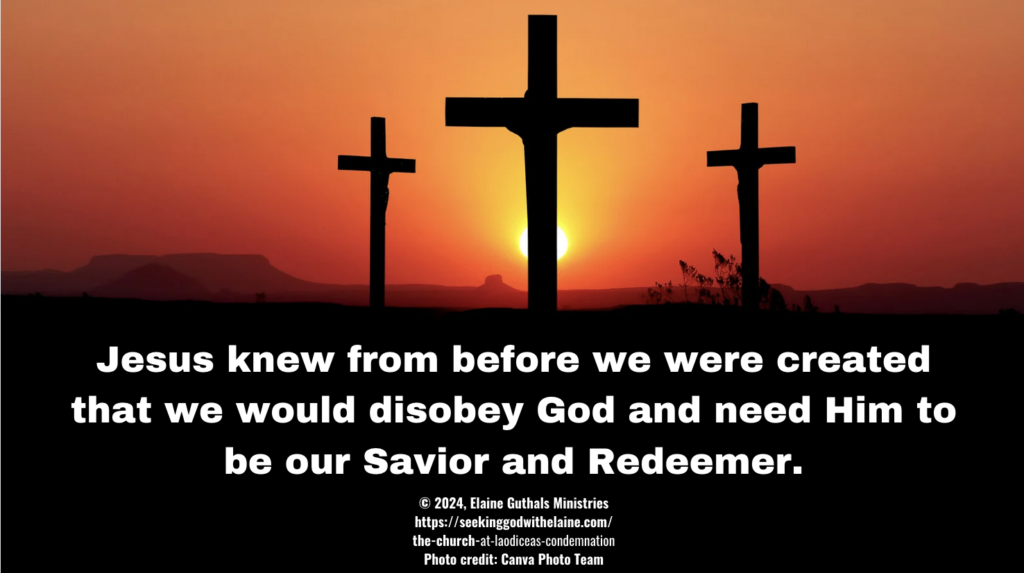Things are not always as they seem, even in some churches. This devotional reading begins to look at the condemnation received by the Messianic congregation at Laodicea by seeing what is meant by the term lukewarm.
Nuggets
- Laodicea was a wealthy city where its wealth didn’t help them.
- There is no physical description, but the majesty of the three characteristics is evident.
- The congregation at Laodicea was not the strong disciples they may have thought they were because they were putting their trust in their wealth rather than God.

Well, there is good and bad in everything, and that would about describe Laodicea. Only what they thought was good was really bad.
The problem was the presence of the perceived good and bad in reality meant they were not focusing on God as they should.
Let’s see what we can glean from this last congregational letter.
Let's Put It into Context
To read devotions in the On the Day of the Lord theme, click the button below.
Devotions in the The Letters to the Congregations series
To the Church in Laodicea
“And to the angel of the church in Laodicea write …” (Rev. 3: 14 ESV)
Laodicea was a wealthy city where its wealth didn’t help them.
Another wealthy city on the trade route, Laodicea grew to be a banking center. It was known for its production and distribution of ear and eye medicines as well as wool.
But the congregation also had its problems. We know that Paul was concerned about it. “For I want you to know how great a struggle I have for you and for those at Laodicea and for all who have not seen me face to face, that their hearts may be encouraged, being knit together in love, to reach all the riches of full assurance of understanding and the knowledge of God’s mystery, which is Christ, in whom are hidden all the treasures of wisdom and knowledge” (Col. 2: 1-3 ESV).
Paul may not have gotten to visit Laodicea, but he did write them a letter that did not survive the ages. “Give my greetings to the brothers at Laodicea, and to Nympha and the church in her house. And when this letter has been read among you, have it also read in the church of the Laodiceans; and see that you also read the letter from Laodicea” (Col. 4: 15-16 ESV).
Currently, the former city of Laodicea is in ruins. It was destroyed by an earthquake in 600 AD. Even tombs have been desecrated.
The city is now called Denizli. A large city, it has few Muslim converts.
Vision Man’s Greeting
“… ‘The words of the Amen, the faithful and true witness, the beginning of God’s creation’” (Rev. 3: 14 ESV)
There is no physical description, but the majesty of the three characteristics is evident.
Reading this greeting, we would think that Audio Man is Jesus.
Amen
When saying amen, we think of it as our giving our consent and agreement to what was said in the prayer. We wouldn’t be thinking that God was agreeing with Himself.
Here, the Amen means more that it is truth. It is talking authority.
It is showing us God’s and Jesus’ immutability. They will not change. We can take what They say to the bank.
There is one place in one translation that uses Amen as God’s name. “He who is blessed in the earth is blessed in the God, Amen, and he who swears in the earth swears in the God, Amen, because the former distresses shall be forgotten and they shall be hidden from before me” (Isa. 65: 16 ABPE).
This ties the letter to the Laodiceans to the Old Testament. Look at how the Complete Jewish Bible translates it. “Thus someone on earth who blesses himself will bless himself by the God of truth, and someone on earth who swears an oath will swear by the God of truth; for past troubles will be forgotten, hidden from my eyes” (Isa. 65: 16 CJB).
God is the God of truth. That doesn’t change.
Because God is the God of truth, we can give Him our absolute trust. Everything about Him — His love, His grace and mercy — is something on which we can count.
Let’s look at it this way. Amen is a definitive word. What was said before is conclusive.
If this is a title for Jesus, He is true. “Jesus said to him, ‘I am the way, and the truth, and the life. No one comes to the Father except through me’” (Jn. 14: 6 ESV).
Jesus is conclusive. His opinion doesn’t waffle around. We know His standards will not change.
Jesus champions God’s Will. Called the Word (Jn. 1: 1), Jesus shows us the character of God.
Both God and Jesus agree wholeheartedly. He agreed enough to die on a cross for our sake to accomplish God’s Plan of Salvation.
God and Jesus will live forever. God’s laws and commandments will never be abolished (Mt. 5: 17).
They are eternal.
The Faithful and True Witness
Culross saw the necessity for both words — faithful and true. He wrote, “Taken together, they mark that He kept back nothing which the Father delivered unto Him, and that all He said might be relied upon to the last jot and tittle.”
Resource
Jesus is a true witness because He completely shows us the Father. He doesn’t hide anything from us.
One of the purposes of His mission was that Jesus was the faithful and true witness of God. “Jesus said to him, ‘Have I been with you so long, and you still do not know me, Philip? Whoever has seen me has seen the Father. …’” (Jn. 14: 9 ESV).
But we do know there was a time with the Pharisees that they called Him out for being His own witness. “Jesus answered, ‘Even if I do bear witness about myself, my testimony is true, for I know where I came from and where I am going, but you do not know where I come from or where I am going’” (Jn. 8: 14 ESV).
Jesus personally knew God. He had lived with Him for the eternity before He came to earth. He was a valid witness for Him.
The Beginning of God’s Creation
“… the beginning of God’s creation” (Rev. 3: 14 ESV) is an interesting translation of this – and the usual one.
The New International Version translates it as “… the ruler of God’s creation” (Rev. 3: 14 NIV). I can see it referring to either God or Jesus. God is identified as Creator. “In the beginning, God created the heavens and the earth” (Gen. 1: 1 ESV).
But we know Jesus was also Creator. “In the beginning was the Word, and the Word was with God, and the Word was God. He was in the beginning with God. All things were made through him, and without him was not any thing made that was made” (Jn. 1: 1-3 ESV).
When we think about ruler, we think of Jesus there, too. “And Jesus came and said to them, ‘All authority in heaven and on earth has been given to me’” (Mt. 28: 18 ESV).
Something just flitted into my mind. I may be totally off on it, but here goes.
What if “… the beginning of God’s creation” (Rev. 3: 14 ESV) isn’t referring to the creation of the universe? What if it is referring to the creation of the Plan of Salvation?
The Plan of Salvation started way back in Genesis 3 with Jesus’ role plainly identified. “I will put enmity between you and the woman, and between your offspring and her offspring; he shall bruise your head, and you shall bruise his heel” (Gen. 3: 15 ESV).
Really, it began even before that. “even as he chose us in him before the foundation of the world, that we should be holy and blameless before him.…” (Eph. 1: 4 ESV).
Jesus knew from before we were created that we would disobey God and need Him to be our Savior and Redeemer.

We know Jesus is considered the firstborn and firstborn from the dead.
- “He is the image of the invisible God, the firstborn of all creation” (Col. 1: 15 ESV).
- “And he is the head of the body, the church. He is the beginning, the firstborn from the dead, that in everything he might be preeminent” (Col. 1: 18 ESV).
The Plan of Salvation all hinges on Jesus being first.
Laodicea’s Condemnation
“I know your works: you are neither cold nor hot. Would that you were either cold or hot! So, because you are lukewarm, and neither hot nor cold, I will spit you out of my mouth” (Rev. 15-16 ESV)
The congregation at Laodicea was not the strong disciples they may have thought they were because they were putting their trust in their wealth rather than God.
Neither Hot nor Cold
How did the congregation see themselves? I bet they thought they were exactly following God’s Will.
Audio Man accused the congregation of being lukewarm.
Hughes identified what the Laodiceans were doing. He wrote they were practicing “Latitudinarian. allowing latitude in religion; showing no preference among varying creeds and forms of worship.”
Resource
This whatever-floats-your-boat, indifferent attitude isn’t that to which God is striving. He demands His worship His way.
Mackennal argued they were lukewarm because they were self-complacent. It was his fear that more disciples are lukewarm than they realize.
Resource
How does this temperature change happen? Culross thought they started out like Ephesus — they lost their first love. We do this by making an idol out of something. We put it over God.
But I think they have to go even further to earn this scathing condemnation.
Their apathy probably played a big part — with a huge dose of neglect.
Another major contributing factor had to have been unbelief. Either they didn’t totally believe in Who Jesus was, or they didn’t totally believe God’s promises.
I think that lukewarm can also apply to those disciples who believe they have interpreted God’s Word 100% correctly, but we haven’t. We are so convinced that our ways are right, we won’t listen for even a second to any other interpretation.
God has told Pastor Steve that the Church has missed Jesus. We are ignorant and apathetic. We don’t know and don’t care that we don’t know God’s truth.
But we think we are living directly in God’s Will. Wrong.
Think about it. Not caring about the truth means our relationship with God isn’t really important.
That is being lukewarm.
Culross also wondered if the Laodiceans truly fear the need for salvation. They like so many today may not see things as sinful, negating the need for conversion.
Resource
That puts our preferences over God’s laws and commandments. That doesn’t work.
We also disobey God’s laws and commandments by continuing to sin. We may think that they are little inconsequential sins — or maybe no sins at all – but God does. That disobedience, even if it is only to some of God’s laws and commandments, causes us to be lukewarm.
A subtle but critical cause for us, our lukewarmness is taking our focus off guard and putting it on the world. At times, this world clamors for that focus, but we must keep God as our first priority.
We focus so much on the congregation being lukewarm, we don’t really see what isn’t there.
Since no works were acknowledged, that wasn’t the most important thing. The most important thing was their motivation was all wrong.
I can get why Audio Man says that He would rather the congregation be either hot or cold. A lukewarm congregation is useless.
But then, it really isn’t God’s Church, is it, if it is lukewarm. It certainly isn’t if it is compromising.
The kicker is the Laodicean congregation thought they were good to go. In fact, they were more than happy with the “spiritual life” they had created.
God wasn’t.
It isn’t just about loving God. It is loving him enough to keep His laws and commandments.

Mackennal said that disciples should be earnest. We call that sober minded.
Sober mindedness does not mean only that we are doing things in moderation. Yes, God wants us to be even keeled.
But this isn’t talking about being in the middle of the extremes.
Being sober minded means our focus is on God. We are content even in the extremes because our trust is in Him.
Being lukewarm fosters no response to God. It cultivates an indifference.
Don’t think that the cure for the indifference is just to do more service. Service done with the wrong motivation — without God — is not service.

Maybe a little worse than the indifference the Laodiceans were experiencing is the carelessness under which they operated.
The only way to counteract self-complacency is to imitate Jesus. Only through having His attitude will we see His glory.
If hot means that the congregation was following God’s Will, and cold means they were following Satan’s, then lukewarm means they were compromising with the worldview.
Compromise is unacceptable!
Spew Out of My Mouth
The consequence of remaining lukewarm was to be expulsion. The church will be left in its sinful state. Christ will no longer be its Advocate.
It is logical that Jesus would spew us out of His mouth. We are Christ’s mouthpieces as we witness for Him.
The Faithful Witness is going to expel the unfaithful pretenders.
Jesus will be our Judge.
Culross thought the lukewarm people will be judged as sheep. I hope so, but I don’t know. They may be the Matthew 7: 21 people who are goats masquerading as sheep.
What this is saying is our neglect cuts God more than our disobedience. He would rather we chose not to follow Him than to choose to follow Him and not.
That is a direct insult to God. And we think God will still consider us His children?
The Laodiceans were being hypocrites because they are imposters. What did Jesus call the Pharisees — hypocrites and vipers.
This is because they are trying to serve two masters. “No one can serve two masters, for either he will hate the one and love the other, or he will be devoted to the one and despise the other. You cannot serve God and money” (Mt. 6: 24 ESV).
Erskine called out the Laodiceans because they did not try to ensure they didn’t sin. They didn’t try to worship God the correct way.
Resource
It was bad enough going back to the Jewish ways. It is worse to go back to sinful ways.
Making the Connections #1
The congregation at Laodiceans was affluential. Yet it didn’t get a commendation.
Oh, yes. We will find out in the next devotion that they did have a remanent of faithful.
But their wealth did not save them.
Making the Connections #2
We want to make sure that we remain hot. Once we start slipping toward lukewarm, it is difficult to heat us back up.
Exell told us how to get back. He wrote, “It should be awakened by a study of the lives of the Old and New Testament saints, by the earnest life of Christ, by the great need of the world, by the transitoriness of life, and by the quickening influences of the Divine Spirit.”
Resource
That sounds an awful lot like what we do to seek God, doesn’t it?
Searching for and Seeking God
Hearing His Word (Rom. 10: 17)
Reading His Word (Rev. 1: 3)
Praying to Him (Heb. 4: 16)
Studying His Word (Ac. 17: 11)
Meditating on His Word (Ps. 1: 1-2)
Memorizing His Word (Ps. 119: 11)
Well, that is what we need to do. We need to get back to Him.
We have to be rooted and grounded in Jesus.
Making the Connections #3
Do you think it is strange that Audio Man would rather we be sinners than lukewarm disciples? I don’t.
Think how much damage even one lukewarm disciple can do. If that disciple is a leader, s/he can be leading others down the wrong path.
That is what Satan wants. He wants us ineffectual.
A true disciple doesn’t want that!
Making the Connections #4
I love what Spurgeon had to say. He wrote, “We shall never get right as long as we are confident that we are so already. Self-complacency is the death of repentance.”
Resource
We will never repent if we don’t feel we aren’t wrong. So, we will be sinful on the Day of the Lord instead of redeemed.
Making the Connections #5
What? You don’t think a church can become corrupt? Of course it can. It is made up of people.
We have to choose daily to follow God. “And he said to all, ‘If anyone would come after me, let him deny himself and take up his cross daily and follow me’” (Lk. 9: 23 ESV).
If the Church does not choose God daily, it becomes more and more corrupt. If it compromises, it becomes more corrupt.
The Church can decay.
How Do We Apply This?
- Be sober minded, not complacent.
- Take the time to tend our spiritual life when we become complacent and compromise.
- Set our focus on God and make Him our top priority.
Resources
What do you think?
Leave me a comment below (about this or anything else) or head over to my Facebook group for some interactive discussion.
If you don’t understand something and would like further clarification, please contact me.
If you have not signed up for the email providing the link to the devotions and the newsletter, do so below.
If God has used this devotion to speak with you, consider sharing it on social media.